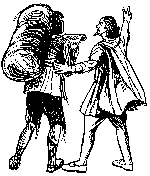
This Page Title – An Ever-Abiding Principle of Christian Living
The Wicket Gate Magazine "A Continuing Witness".
Internet Edition number 79 – placed on line July 2009
Magazine web address – www.wicketgate.co.uk
My Dear Friends,
The past month, in common with many others, has seen yet another catalogue of violence, crime and tragedy let loose upon the world and those who live in it. The presence of evil and lawlessness has almost the ability to be felt in our midst in these days in which we live, and even the believing people of God are often hard-pressed to know how to react in the thick blackness that almost seems to threaten the very existence of life itself.
This short note is not to set forth any universal course of procedure that will bring instant tranquility and peace to the sincere believer "in the midst of a crooked and perverse nation," but simply to remind us that the very blackness itself may well be used by us as a "shelter in a time of storm" and, in fact, turned to our advantage to the praise of God's Name. You get the principle set out in the apostle Paul's epistle to the church at Colosse – in the thirteenth verse of the first chapter. Paul is relating to the Colossian Christians the gist of a prayer that he has been offering up on their behalf, and one of the things that he has been praying might be their portion, is a spirit of thankfulness; that they might learn to give "thanks unto the Father." He then enumerates some of the causes for thanksgiving (not least among them, of course, the fact of God being their "Father") and one of these is contained in the remembrance that it is the heavenly Father, says Paul, "Who hath delivered us from the power of darkness, and hath translated us into the kingdom of his dear Son."
The picture that the great apostle draws for the Colossians, and all the believing people of God, is a very vivid one. He sees our heavenly Father as entering into that domain of darkness that was the land of our birth by nature, conquering the old prince of that domain, the devil, liberating that multitude that no man can number that he held in bondage, and leading them out and "planting" them afresh in a new and glorious kingdom, even "the kingdom of his dear Son." It's like Israel being "delivered" from the land of Egypt, from the house of bondage, and being "transplanted" in the land of Canaan, in the place of promise. That deliverance and translating, you remember, was ever the subject of the prophets' preaching to call a thankless people of Israel back to that needed steadfast love towards Jehovah; and it is the same motive that lies behind Paul's gracious prayer for the church at Colosse. Not that that church was thankless, but in order to make them all the more thankful Paul will hold forth the facts of their great release and deliverance from the "power of darkness" and their translation into "the kingdom of God's dear Son."
Now, of course, that is an ever-abiding principle of our Christian living: "He that is forgiven much, the same loveth much." That is, the more we come to realise our "deliverance" and "translation" the more we will be "Giving thanks unto the Father … who hath delivered us from the power of darkness" etc. But, here is the application of that principle, surely, especially for us who have been called to live and to witness in these days of such darkness and blackness: the more the darkness is manifest, the more our thanksgiving should be manifest. In other words, as the "power of darkness" begins to more and more display that darkness, then the thanksgiving and thankfulness of the believer delivered from that darkness – now so manifest – should abound more and more where it seldom ever abounded before.
What generation of Christians ever had a better opportunity to see sin as so "exceeding sinful"? To see the power of darkness as so almost near all-powerful? Even so, then; the more obvious it is to see what we have been delivered from the more thankful we should be for our deliverance. There was a time when it was said that there was "A face of Godliness upon this land" of ours. Now, at such a time, the believing church of Christ may have been excused a little for a spirit of matter-of-fact acceptance of the salvation that was held in common by so many people. This wasn't the case, of course, and those old believers of those days knew the darkness of their own hearts and minds that they had been delivered from. But, we today, you see, have both counts to assist us: the inner knowledge of our own black natures from which we have been delivered, and the gross darkness - manifesting the power of darkness - out of which God has called us, into His marvellous light.
We are often exhorted: look around you and see the many benefits that God has bestowed upon you; should this not make you thankful? And, indeed, it should. But, we may also turn even the present evil days that we live in to a source of thanksgiving, as well, for, look around you, believer, – at all the sin, all the evil, all the wrath, all the iniquity, all the blackness, all the darkness – and surely that look will cause you to be found – "Giving thanks unto the Father … who hath delivered us from the power of darkness, and hath translated us into the kingdom of his dear Son."
So be it!
W. J. Seaton
(October 1971)

This Page Title – An Ever-Abiding Principle of Christian Living The Wicket Gate Magazine "A Continuing Witness". Internet Edition number 79 – placed on line July 2009 Magazine web address – www.wicketgate.co.uk |